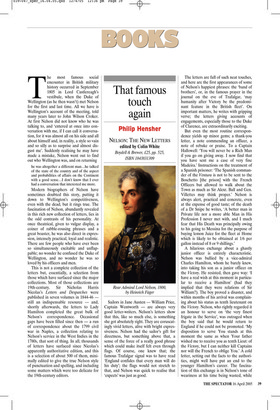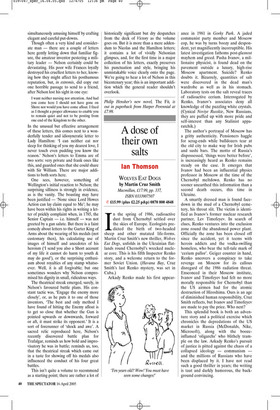That famous touch again
Philip Hensher
NELSON: THE NEW LETTERS edited by Colin White Boydell & Brewer, £25, pp. 525, ISBN 1843831309 The most famous social encounter in British military history occurred in September 1805 in Lord Castlereagh’s vestibule, when the Duke of Wellington (as he then wasn’t) met Nelson for the first and last time. All we have is Wellington’s account of the meeting, told many years later to John Wilson Croker. At first Nelson did not know who he was talking to, and ‘entered at once into con versation with me, if I can call it conversation, for it was almost all on his side and all about himself and, in reality, a style so vain and so silly as to surprise and almost disgust me’. Suddenly realising he may have made a mistake, Nelson went out to find out who Wellington was, and on returning
he was altogether a different man...he talked of the state of the country and of the aspect and probabilities of affairs on the Continent with a good sense...I don’t know that I ever had a conversation that interested me more.
Modern biographers of Nelson have sometimes doubted this story, putting it down to Wellington’s competitiveness, even with the dead, but it rings true. The fascination of Nelson, abundantly revealed in this rich new collection of letters, lies in the odd contrasts of his personality. At once theatrical, given to vulgar display, a coiner of rabble-rousing phrases and a great boaster, he was also direct in expression, intensely practical, loyal and realistic.
There are few people who have ever been so simultaneously excitable and unflappable; no wonder he confused the Duke of Wellington, and no wonder he was so loved by his officers and men.
This is not a complete collection of the letters but, essentially, a selection from those which have surfaced since the major collections. Most of those collections are 19th-century. Sir Nicholas Harris Nicolas’s Letters and Despatches were published in seven volumes in 1844-46 still an indispensable resource — and, shortly afterwards, the letters to Lady Hamilton completed the great bulk of Nelson’s correspondence. Occasional gaps have been filled since then — a run of correspondence about the 1799 civil war in Naples, a collection relating to Nelson’s service in the West Indies in the 1780s, that sort of thing. In all, thousands of letters have surfaced since Nicolas’s apparently authoritative edition, and this is a selection of about 500 of them, mini mally edited to give the true Nelson style of punctuation and spelling, and including some matters which were too delicate for the 19th-century editors. Sailors in Jane Austen — William Price, Captain Wentworth — are always very good letter-writers. Nelson’s letters show that this, like so much else, is something she got absolutely right. They are coruscatingly vivid letters, alive with bright expressiveness. Nelson had the sailor’s gift for directness, but something above that, a sense of the force of a really good phrase which could make itself felt even through flags. Of course, one knew that; the famous Trafalgar signal was to have read ‘England confides that every man will do his duty’; the flags would not stretch to that, and Nelson was quick to realise that ‘expects’ was just as good. The letters are full of such neat touches, and here are the first appearances of some of Nelson’s happiest phrases: the ‘band of brothers’, or, in the famous prayer in the journal on the eve of Trafalgar, ‘may humanity after Victory be the predominant feature in the British fleet’. On important matters, he writes with gripping verve; the letters giving accounts of engagements, especially those to the Duke of Clarence, are extraordinarily exciting.
But even the most routine correspondence yields up minor gems; a thank-you letter, a note commending an officer, a note of rebuke or praise. To a Captain Hallowell: ‘You will never be a Rich Man if you go on giving away. I now find that you have sent me a case of very fine Madeira.’ Instructions on the treatment of a Spanish prisoner: ‘The Spanish commander of the Ventura is not to be sent to the Boschetto [the prison] with the French Officers but allowed to walk about the Town as much as Sir Alexr. Ball and Gen. Villettes may think proper.’ Nelson is always alert, practical and concrete, even at the expense of good taste; of the death of a Dr Snipe he writes, ‘A better man in Private life nor a more able Man in His Profession I never met with, and I much fear that His Death was principally owing to his going to Messina for the purpose of buying lemon Juice for the fleet at Home which is likely to be obtained at 1/6 per gallon instead of 8 or 9 shillings.’ A hilarious exchange about a ghastly junior officer is entirely characteristic. Nelson was bullied by a vice-admiral Charles Hamilton, whom he barely knew, into taking his son as a junior officer on the Victory. He resisted, then gave way: ‘I have a real wish at this moment in particular to receive a Hamilton’ (had they implied that they were relations of Sir William?). The boy proved a disaster, and within months of his arrival was complaining about his status as tenth lieutenant on the Victory. Nelson, who rightly regarded it an honour to serve on ‘the very finest frigate in the Service’, was outraged when the boy said that he would return to England if he could not be promoted. ‘My disposition to serve You stands at this moment the same as when Your father wished me to receive you as tenth Lieut: of the Victory, but I can neither kill Captains nor will the French to oblige You.’ A cold letter, setting out the facts to the authorities, might well have put an end to the younger Hamilton’s career. The fascination of this exchange is in Nelson’s tone of weariness at his time being wasted, while simultaneously amusing himself by crafting elegant and careful put-downs.
Though often a very kind and considerate man — there are a couple of letters here gently letting down that familiar figure, the amateur inventor pestering a military leader — Nelson certainly could be devastating. His poor wife Frances loyally destroyed his cruellest letters to her, knowing how they might affect his posthumous reputation, but, in extremis, did copy out one horrible passage to send to a friend, after Nelson lost his sight in one eye:
I want neither nursing nor attention. And had you come here I should not have gone on Shore nor would you have come afloat. I fixed as I thought a proper allowance to enable you to remain quiet and not to be posting from one end of the Kingdom to the other.
In the unusual but effective arrangement of these letters, this comes next to a wonderfully tender and idiosyncratic letter to Lady Hamilton: ‘I can neither eat nor sleep for thinking of you my dearest love, I never touch even pudding you know the reason.’ Nelson’s letters to Emma are of two sorts: very private and frank ones like this, and guarded ones that she could share with Sir William. There are major additions to both sorts here.
One sees, however, something of Wellington’s initial reaction to Nelson; the surprising silliness is strongly in evidence, as is the vanity. The boasting may have been justified — ‘None since Lord Howes Action can lay claim equal to Me’; he may have been within his rights in writing a letter of prickly complaint when, in 1785, the Senior Captain — i.e. himself — was not greeted by a gun salute. But there is a faint comedy about letters to the Garter King of Arms about the wearing of his medals (not customary then), his calculating use of images of himself and anecdotes of his heroism (‘I send you also a Short account of my life it cannot do harm to youth & may do good’), or the surprising enthusiasm about royalties of any stamp whatsoever. Well, it is all forgivable; but one sometimes wonders why Nelson compromised his dignity in small, ridiculous ways.
The theatrical streak emerged, surely, in Nelson’s favoured battle plans. His constant tactic was, ‘Engage the enemy more closely’, or, as he puts it to one of those inventors, ‘The best and only method I have found of hitting the Enemy afloat is to get so close that whether the Gun is pointed upwards or downwards, forward or aft, it must strike its opponent.’ It is a sort of forerunner of ‘shock and awe’. A sacred relic reproduced here, Nelson’s recently discovered battle plan for Trafalgar, reminds us how bold and improvisatory he was in battle; reminds us, too, that the theatrical streak which came out in a taste for showing off his medals also influenced the conduct of his four great battles.
This isn’t quite a volume to recommend as a starting point; there are rather a lot of historically significant but dry despatches from the deck of Victory as the volume goes on. But it is more than a mere addendum to Nicolas and the Hamilton letters; it contains a lot of vividly Nelsonian glimpses, and, for the first time in a major collection of his letters, exactly preserves his punctuation and style, bringing his unmistakable voice clearly onto the page. We’re going to hear a lot of Nelson in this bicentenary year; this is an important addition which the general reader shouldn’t overlook.

























































 Previous page
Previous page